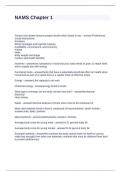Nams chapter 1 - Study guides, Class notes & Summaries
Looking for the best study guides, study notes and summaries about Nams chapter 1? On this page you'll find 55 study documents about Nams chapter 1.
All 55 results
Sort by
NAMS Chapter 1 Menopause Test Latest Update...
NAMS Chapter 1
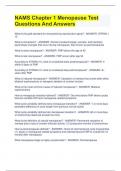
-
NAMS Chapter 1 Menopause Test Questions And Answers
- Exam (elaborations) • 5 pages • 2023
-
- $9.99
- + learn more
NAMS Chapter 1 Menopause Test Questions And Answers What is the gold standard for characterizing reproductive aging? - ANSWER- STRAW + 10 What is climacteric? - ANSWER- Period of endocrinologic, somatic, and transitory psychologic changes that occur during menopause. Also known as perimenopause What is early menopause? - ANSWER- FMP before the age of 45 What is late menopause? - ANSWER- FMP occurs after age 54 According to STRAW+10, what is considered early postmenopause? - ANSWER...
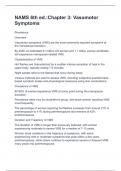
-
NAMS 6th ed Question and answers correctly solved
- Exam (elaborations) • 12 pages • 2024
-
Available in package deal
-
- $13.99
- + learn more
NAMS 6th ed Question and answers correctly solved NAMS 6th ed.:Chapter 3: Vasomotor Symptoms Prevalence Overview Vasomotor symptoms (VMS) are the most commonly reported symptoms of the menopause transition. By 2025, an estimated 21 million US women and 1.1 billion women worldwide will experience menopause-related VMS. Characteristics of VMS Hot flashes are characterized by a sudden intense sensation of heat in the upper body, typically lasting 1-5 minutes. Night sweats refer to hot fla...
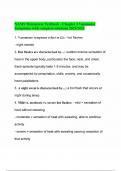
-
NAMS Menopause Textbook - Chapter 3 Vasomotor Symptoms with complete solutions 2024/2025
- Exam (elaborations) • 10 pages • 2024
-
Available in package deal
-
- $8.48
- + learn more
NAMS Menopause Textbook - Chapter 3 Vasomotor Symptoms with complete solutions 2024/2025 1. Vasomotor symptoms refers to (2): - hot flashes - night sweats 2. Hot flashes are characterized by....: sudden intense sensation of heat in the upper body, particularly the face, neck, and chest. Each episode typically lasts 1-5 minutes, and may be accompanied by perspiration, chills, anxiety, and occasionally heart palpitations 3. A night sweat is characterized by....: a hot flash that occurs at n...
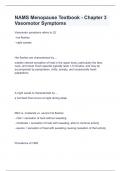
-
NAMS Menopause Textbook Questions with complete solution
- Exam (elaborations) • 9 pages • 2024
-
Available in package deal
-
- $13.99
- + learn more
NAMS Menopause Textbook Questions with complete solution NAMS Menopause Textbook - Chapter 3 Vasomotor Symptoms Vasomotor symptoms refers to (2) - hot flashes - night sweats Hot flashes are characterized by.... sudden intense sensation of heat in the upper body, particularly the face, neck, and chest. Each episode typically lasts 1-5 minutes, and may be accompanied by perspiration, chills, anxiety, and occasionally heart palpitations A night sweat is characterized by.... a hot...

-
NAMS Menopause Textbook - Chapter 3 Vasomotor Symptoms with complete solutions.
- Other • 6 pages • 2024
- Available in package deal
-
- $9.99
- + learn more
NAMS Menopause Textbook - Chapter 3 Vasomotor Symptoms with complete solutions.Vasomotor symptoms refers to (2) 2. Hot flashes are characterized by.... 3. A night sweat is characterized by.... 4. Mild vs. moderate vs. severe hot flashes - hot flashes - night sweats sudden intense sensation of heat in the upper body, particularly the face, neck, and chest. Each episode typically lasts 1-5 minutes, and may be accompanied by perspiration, chills, anxiety, and occasionally heart palpita...
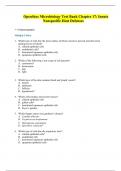
-
OpenStax Microbiology Test Bank Chapter 17: Innate Nonspecific Host Defenses
- Exam (elaborations) • 13 pages • 2024
- Available in package deal
-
- $13.50
- + learn more
OpenStax Microbiology Test Bank Chapter 17: Innate Nonspecific Host Defenses * = Correct answer Multiple Choice 1. Which type of cells line the inner surface of blood vessels to prevent microbes from gaining access to blood? A. ciliated epithelial cells B. endothelial cells* C. keratinized squamous epithelial cells D. squamous epithelial cells 2. Which of the following is not a type of cell junction? A. centromere* B. desmosome C. gap D. tight 3. Which layer of the skin...
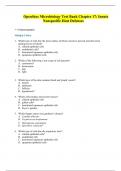
-
OpenStax Microbiology Test Bank Chapter 17: Innate Nonspecific Host Defenses
- Exam (elaborations) • 13 pages • 2024
-
Available in package deal
-
- $13.50
- + learn more
OpenStax Microbiology Test Bank Chapter 17: Innate Nonspecific Host Defenses * = Correct answer Multiple Choice 1. Which type of cells line the inner surface of blood vessels to prevent microbes from gaining access to blood? A. ciliated epithelial cells B. endothelial cells* C. keratinized squamous epithelial cells D. squamous epithelial cells 2. Which of the following is not a type of cell junction? A. centromere* B. desmosome C. gap D. tight 3. Which layer of the skin...
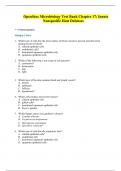
-
OpenStax Microbiology Test Bank Chapter 17: Innate Nonspecific Host Defenses
- Exam (elaborations) • 13 pages • 2024
-
- $16.99
- + learn more
OpenStax Microbiology Test Bank Chapter 17: Innate Nonspecific Host Defenses * = Correct answer Multiple Choice 1. Which type of cells line the inner surface of blood vessels to prevent microbes from gaining access to blood? A. ciliated epithelial cells B. endothelial cells* C. keratinized squamous epithelial cells D. squamous epithelial cells 2. Which of the following is not a type of cell junction? A. centromere* B. desmosome C. gap D. tight 3. Which layer of the skin...

Study stress? For sellers on Stuvia, these are actually golden times. KA-CHING! Earn from your study resources too and start uploading now. Discover all about earning on Stuvia


